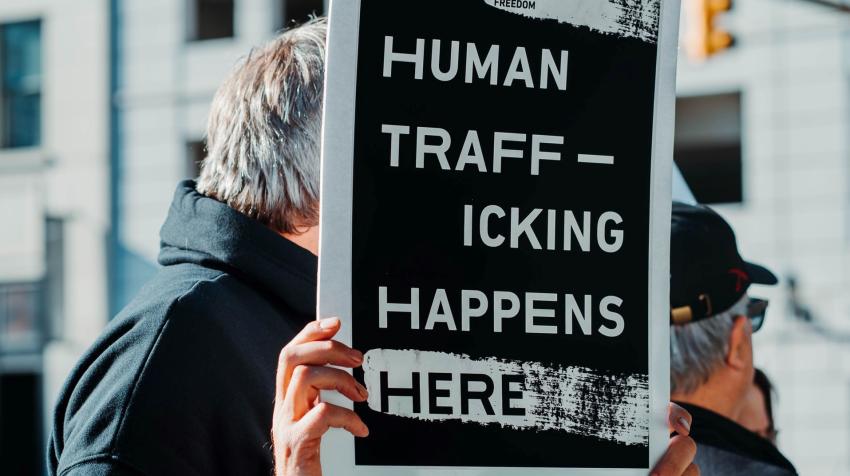
Photo: Hermes Rivera/Unsplash
Repeated concerns about the risk posed to children in state care by human trafficking are expressed in a new report, which also shows that the number of trafficking victims identified in Ireland is up 20% on the previous year, despite continued underestimation.
The report, Trafficking in Human Beings in Ireland, from the Irish Human Rights and Equality Commission (IHREC) also raises concerns about the exploitation of surrogacy by traffickers, which is described as “one of the most concerning novel and emerging forms of trafficking”.
A number of ‘case studies’ of victims’ experiences of human trafficking were also provided to the reports’ authors by the HSE Anti-Human Trafficking Team (HSE AHTT), including that of one woman, Kira, who was trafficked to Ireland from Europe to work in a “food processing plant” for €1 per hour, the rest of her wages held by the alleged trafficker, while her family were threatened by traffickers in her country of origin.
The state reports that 53 people were identified as victims of human trafficking in 2023, representing an increase of 20% on 2022.
The report notes that studies have found the annual data to constitute an underestimation of approximately 40% “due to the clandestine nature of the crime and the complexity in detecting and confirming victims.”
The increase is described as “significant”, with victims being trafficked in Ireland for various forms of exploitation. Sexual exploitation is by far the most prevalent, with 28 identified victims last year, followed by labour exploitation with 16, and nine people trafficked for “criminal activities.”
The vast majority of victims identified in 2023 were female (79%), the report describing as “stark” the increase (by 33%) in female victims across all forms of trafficking from the previous year, while there was a “slight decrease” in male victims (21%) identified overall, including in the usually male-dominated trafficking for labour exploitation.
Five children were identified as victims of human trafficking last year, four girls and one boy, with the report detailing that three of the girls were suspected victims of trafficking for criminal activities, one girl for sexual exploitation and one boy was trafficking for labour exploitation.
The majority (53%) of victims of trafficking last year came from Africa, followed by Europe (28%) and Asia (15%). There were just two victims from Latin America, making up 4 percent.
The report’s first reference to children in state care comes as the Commission recommends that the Health Information Quality Authority (HIQA) perform an “urgent audit” of all state care residential centres to assess the risk of exploitation and human trafficking, as well as the development of “specific strategic plans aimed at preventing the trafficking of all children in Ireland, especially trafficking of children in State care accommodation.”
This comes after a 2023 University College Dublin (UCD) report revealed that vulnerable children in care in Ireland are being targeted for sexual exploitation and abuse by “gangs of predatory men,” a report that referenced multiple cases involving girls in the care of TUSLA, who were “being coerced or enticed to provide sex acts to multiple men in exchange for a variety of goods” including clothes and jewellery.
The IHREC report states repeatedly that the placement of children in state care institutions increases their vulnerability to trafficking and re-trafficking, “during and after their placement in those residencies”.
“Children might be targeted by traffickers through phone calls, visits or use of other residents,” the report reads, referencing the UCD report as it says, “It has been documented that children and young people, especially girls, in residential care settings are being targeted, in a coordinated manner, by organised groups of predatory men for the purpose of their sexual exploitation.”
New forms of exploitation are also documented in the IHREC report, including the exploitation of surrogacy by traffickers, which is listed alongside other forms of exploitation targeted by the 2022 amendment of the 2011 EU Anti-Trafficking Directive such as forced marriage and illegal adoption.
In its recommendations to the state concerning surrogacy, the Commission advises that the state “carefully examines whether those protections are capable of being implemented and/or whether they are sufficient for the reality of the market this [AHR] Bill seeks to regulate”.
A number of case studies are included throughout the report, including the example of an African national, Ada (39), who upon arriving in Ireland was “confined against her will and subjected to sexual exploitation for approximately one year”.
Ada was abused and raped by men, “including men who were hooded,” the report states, before escaping from traffickers in 2018 and ending up homeless.
Another woman, Kira, was offered work in Ireland by someone she knew. Recruited by an EU national alongside 25 others to work at an unnamed “food processing plant” in Ireland, Kira’s transport was paid for while her alleged trafficker also provided accommodation.
The “EU national/alleged trafficker paid her wages directly after receiving the salary from the factory owner/employer of the food processing plant in Ireland. There was an agreement to repay the travel expenses to Ireland. Kira’s wages worked out approximately €1 per hour as the rest was held by the alleged trafficker. Kira was told she would not be allowed to leave until she repaid her debt. She was threatened that her family would be targeted if she left,” the case study reads.
In total, 566 people have been identified as victims of trafficking in Ireland since 2013, with 44 of these children.
This article originally appeared in Gript on September 20, 2024 and is reprinted with permission.
